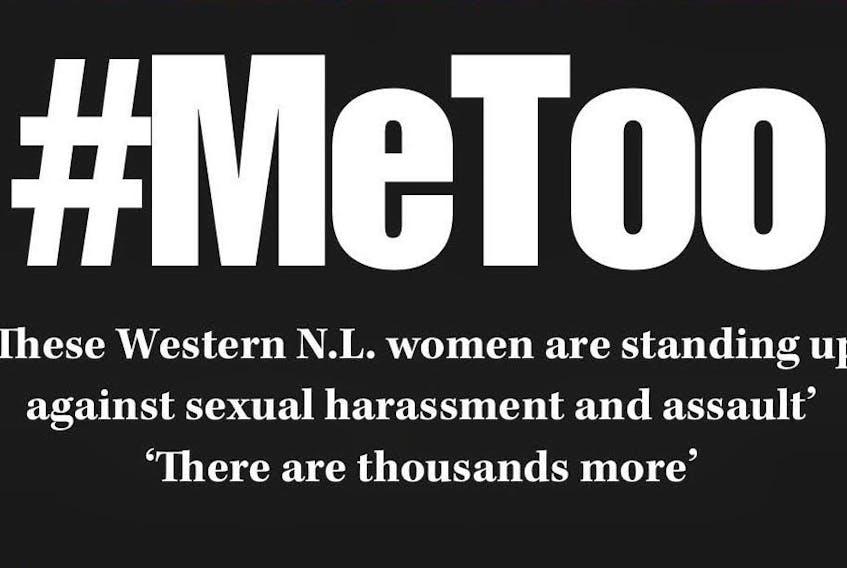
There are all kinds of ways it can go down.
A group of teenage boys hanging in the school hallway think it’s fun to rate girls as they walk by.
A guy in one of your university classes keeps harassing you to go out with him even when you say no. That harassment extends to contact through social media.
A group of construction workers whistle and yell sexually suggestive comments as a woman walks down a street.
That touchy-feely co-worker can’t seem to talk to you without putting his arm on your shoulder.
The guy in the bar thinks it’s OK to pat you on the butt.
Or it could be something much worse.
How it happens is not what matters. What matters is what it is and that’s sexual harassment.
This week women have taken to social media to take a stand against sexual harassment and abuse buy simply posting two words — “Me Too.”
Those words have been associated with sexual violence against women for sometime, but have really come to light in response to the scandal involving American film producer Harvey Weinstein, who has been accused of making unwanted advances towards and sexual assaulting a large number of female actors.
Paula Sheppard Thibeau is the executive director of the Corner Brook Status of Women Council.
She said sexual harassment is very common among women and girls and includes everything from the cat calls to the physical assaults.
“It’s all of these pieces that are based on our gender.”
So does saying “Me Too” raise the awareness that the issue needs?
Sheppard Thibeau thinks it does.
“It’s opening the discussion,” she said.
It’s a discussion that has always happened behind closed doors, but social media gives it another avenue to be brought out.
It’s not an easy discussion, though, and Sheppard Thibeau said there are still a lot of people who are reluctant to be a part of it.
“And that’s OK. They don’t owe their story to anybody.”
She said people recognize the courage it takes to actually put that out there and she paused herself before posting on her own social media.
“In a way I’m outing myself and I feared backlash.”
People are hesitating because they feel they are alone in these experiences and Sheppard Thibeau said these types of campaigns help them see they are not alone and it has encouraged people to disclose.
“I think what it does is it increases the solidarity and decreases the isolation that many people feel.”
So is it something that should have happened a long time ago? Sheppard Thibeau said it’s hard to say.
“Maybe the timing is right now.”

This past week social media has been overtaken with women posting “Me Too” as a status. The little phrase is meant to be a way for women to stand in solidarity with others who have been sexually harassed or abused and to highlight the magnitude of the problem. While “Me Too” has been used for some time to draw attention to the issue, the movement really took off now in response to the Harvey Weinstein scandal. The American film producer has been accused of making unwanted advances towards and sexual assaulting a large number of female actors.
We asked:
Is the “Me Too” campaign having an impact in highlighting the issue of sexual harassment and abuse of woman?
Bernice Hancock, Stephenville
I think the use of social media, especially for younger women, has really increased awareness. And also the shame and the stigma that goes with that, it’s like if people are able to come and say it that it eliminates the stigma of being a victim of sexual assault, sexual abuse. The use of the social media has a very positive impact. It does make a really big difference in engaging younger people — that’s men and women.
Laura Aylward, Stephenville
I think anything like that that can be done to bring the issue to the forefront and put awareness out there is a positive thing. And I think that it will have an impact. It’s been an issue for so long, and for someone to come forward to tell what happened is very difficult. I think it would be a good idea for them to do that and it would help them move forward with it.
Linda Chaisson, Corner Brook
I think it has a major impact. It gives women the right to speak and not have any inhibitions about what they said.
Gudie Hutchings, Corner Brook
I think it’s amazing. The sad part is that we need this, and the sad part is that some people think it’s OK. And it’s not OK. My fear is we’re not teaching enough of our young kids, our youth coming up and all ages. Kids learn by example, so the example that they’re seeing is wrong. I’m proud of it. We need to stand up more for this “Me Too.” It’s 2017, we shouldn’t have this type of behaviour.
Mary Cashin, Corner Brook
I think the purpose of the “Me Too” campaign was to illustrate the number of people affected by sexual harassment/violence, and I think that has been achieved. The positive spinoff of this is that people are talking about this issue and are thinking of ways to make changes.
Jade Kearley, Corner Brook
It’s definitely keeping a dialogue going and that’s what we need. It’s keeping a conversation open and people are becoming more aware and that’s really all good, because in the past these things these were very secretive and taboo.

EDITORIAL
A real problem
Our society is flawed. At times it’s even backwards, riddled with inequality, disrespect and the flagrant abuse of power or privilege. Sometimes it’s shameful to think we live in such a place.
So how do we respond? Do we give up, accept the myopic as the norm and disparity as commonplace? Or do we persevere and vehemently fight to affect change?
The hashtag #MeToo caught social media afire on the weekend as Hollywood actor Alyssa Milano put the call out to victims as means of giving “people a sense of the magnitude of the problem.”
While the online movement started about a decade ago with American activist Tarana Burke, the latest surge of support for #MeToo spawned from allegations of sexual harassment and sexual assault against movie mogul Harvey Weinstein.
In an ideal world, the need to bellow from the rafters that this lewd and crude behaviour (mostly from men) has affected people wouldn’t exist. Just as an ideal world would see us eliminate the need for women’s centres, women’s business groups, women’s trade organizations, et al. Unfortunately, despite decades of “progress,” we’re not there, and these groups forced to fight for equal rights are essential now, as much as they ever were.
Every single woman living in this community, region, province and country has, at some time, probably been subjected to sexual harassment. That is heartbreaking and pathetic but so true, even if they were not aware that that’s what it was.
Harassment doesn’t need to be sustained or predatory. It can range from a whistle to a lewd comment to a seemingly innocent joke, but it’s all there, and it all counts, and most importantly, it’s all wrong.
What’s likely more shocking is the frequency of sexual assaults. Despite the education provided and the severity placed on this horrific crime, it exists in numbers that would shock people. As an illustration, a search for “sex” or “sexual” in the Corner Brook court docket just after Labour Day for the span of the fall yielded more than 100 results. Those charges range from sexual interference to rape and all points in between. That doesn’t include the Stephenville area or further afield of this little region of the province.
Sure there were names there twice and all the charges were allegations only, but you get the picture — and the one it paints is heinous.
The #MeToo awareness may be overstating the obvious, yes, but it sparks a conversation about behaviour we all should be ashamed of. It highlights the ugly and it shines a spotlight on what’s wrong with society.
This conversation must continue.
While we talk, we must also draw focus to the very root of this problem. For every person that can recount an instance of sexual harassment or sexual abuse, there’s someone (often a man) who is guilty of being the perpetrator of these acts. Again, it doesn’t mean all men are predators.
Let’s also not kid ourselves into thinking harassment is reserved for catcalls at construction sites or lecherous barflies looking for a pickup. As much as most won’t ever admit to it, the vast majority of men have been guilty of sexual harassment — at the very least — sometimes in their lives.
While we won’t see #IDid hashtags fill your social media feeds any time soon, it’s the world we live in.
It’s ugly. It’s flawed. And it’s backwards at times.
All we can do to stop it is keep calling out every act of inequality and disrespect and ensure those who have been guilty in the past mend their ways — and the ways of their children — in the future.









